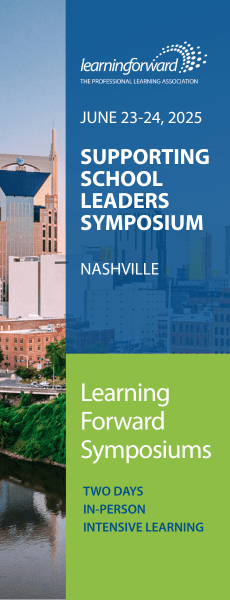To Drive To Strive
An assistant principal reflects on a career built on constant learning
By Learning Forward
Categories: Career pathways, LeadershipOctober 2015
Read the remaining content with membership access. Join or log in below to continue.
Sed ut perspiciatis unde omnis iste natus error sit voluptatem accusantium doloremque laudantium, totam rem aperiam, eaque ipsa quae ab illo inventore veritatis et quasi architecto beatae vitae dicta sunt explicabo. Nemo enim ipsam voluptatem quia voluptas sit aspernatur aut odit aut fugit, sed quia consequuntur magni dolores eos qui ratione voluptatem sequi nesciunt. Neque porro quisquam est, qui dolorem ipsum quia dolor sit amet, consectetur, adipisci velit, sed quia non numquam eius modi tempora incidunt ut labore et dolore magnam aliquam quaerat voluptatem.
A full plate of responsibilities
An educator’s typical day is composed of a series of 15-minute problem-solving segments interspersed with interruptions of tragedy, hilarity, anger, and noise.
As an assistant principal, I aspire to set the school’s vision, increase parental engagement, know the names of all the students, know the birthdays of all the children of faculty members, know the number of students on free and reduced lunch (by gender and ethnicity), develop strategies for increasing test performance, and protect the constitutional rights of every student.
Add to this my participation in teacher observations, with preconferences and post-conferences, and the hours required to type up the observation. The paperwork associated with the evaluation routines for a large faculty is astonishing. And principals are expected to be at every athletic event or club meeting and participate in the civic life of a community after the school day is over.
To these expectations, add the paperwork required by the central office as well as staying up-to-date on the latest instructional materials, teaching methodology, and discipline strategies.
With the increasing emphasis on responding to email and returning telephone messages promptly, a 21st-century principal’s skills also include measuring the response time from when a parent makes a request and that request is answered (Zepeda, 2014).
My responsibilities measure up to those of teachers, students, and parents working to develop a collaborative vision that encompasses and addresses the responsibilities of our roles. I am confident that my experience will help me create a climate of learning at my next school.
— Tameka Osabutey-Aguedje
References
Bibbo, T. & d’Erizans, R. (2014, March). Professional development that works. Principal Leadership, 14(7), 28-32.
Brazer, S.D. & Bauer, S.C. (2013). Preparing instructional leaders: A model. Educational Administration Quarterly, 49(4), 645-684.
Downey, C.J., Steffy, B.E., English, F.W., Frase, L.E., & Poston Jr., W.K. (2004). The three-minute classroom walk-through: Changing school supervisory practice one teacher at a time. Thousand Oaks, CA: Corwin Press.
Dunaway, D.M., Bird, J., Flowers, C., & Lyons, J.E. (2010). Intern and mentor perceptions of the internship experience. Academic Leadership, 8(3), 106-115.
Gordon, S., Jacobs, J., & Solis, R. (2014, December). Top 10 learning needs for teacher leaders. JSD, 35(6), 48-52.
Gupton, S. (2010). The instructional leadership toolbox: A handbook for improving practice. Thousand Oaks, CA: Corwin Press.
Gurley, D.K., Anast-May, L., & Lee, H.T. (2015). Developing instructional leaders through assistant principals’ academy: A partnership for success. Education and Urban Society, 47(2), 207-241.
Mangin, M.M. & Dunsmore, K. (2015). How the framing of instructional coaching as a lever for systemic or individual reform influences the enactment of coaching. Educational Administration Quarterly, 51(2), 179-213.
Nixon, M. (2013, September 3). Advice for women leaders from a former principal. [Web log comment]. Available at https://pdkintl.org/blogs/change-agents/advice-for-women-leaders-from-a-former-principal.
Reeves, D. (2006). The learning leader: How to focus school improvement for better results. Alexandria, VA: ASCD.
Short, P.M. & Jones, R. (1991). How instructional leaders view staff development. NASSP Bulletin, 75(536), 1-6.
Springfield Public Schools. (2014). Framework of professional practice for instructional coaches. Available at www.sps186.org/downloads/table/14887/Framework%20for%20Instructional%20Coach%208:2014.pdf.
Starkman, N., Scales, P., & Roberts, C. (1999). Great places to learn: Creating asset-building schools that help students succeed (1st ed.). Minneapolis, MN: Search Institute.
Whitaker, T. (2003). What great principals do differently: Fifteen things that matter most. Larchmont, NY: Eye on Education.
Zepeda, S.J. (2014). The principal as instructional leader: A handbook for supervisors. New York, NY: Routledge.
Learning Forward is the only professional association devoted exclusively to those who work in educator professional development. We help our members plan, implement, and measure high-quality professional learning so they can achieve success with their systems, schools, and students.
Categories: Career pathways, Leadership
Recent Issues
BUILDING BRIDGES
December 2024
Students benefit when educators bridge the continuum of professional...
CURRICULUM-BASED PROFESSIONAL LEARNING
October 2024
High-quality curriculum requires skilled educators to put it into...
LEARNING TO PIVOT
August 2024
Sometimes new information and situations call for major change. This issue...
GLOBAL PERSPECTIVES
June 2024
What does professional learning look like around the world? This issue...










